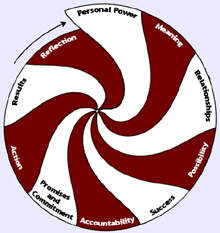You will notice that accountability is in the 'middle'. People surrender to a culture of compliance and it affects everything they do (Figure 2). Accountability is different. Groups of people, for example teams, create a culture of accountability together, deliberately and intentionally, by building relationships. The idea is that groups of people who work together have to strive for accountability. When they reach the point where they can talk to each other about accountability, they will be more effective in what they do because everyone in the group is present, engaged in organizing, and their ideas, intentions, and actions count. What creates and sustains accountability are conversations of aligning, as well as people's enthusiasm, their openness, their commitment to one another and their work, and their willingness to take responsibility for what they do.
Conversations of personal power, relationships, and meaning ground and frame the work people do. Together with conversations of reflection, they are 'bookends' if we view the ten conversations as a sequence.
Why do we begin conversations that build relationships by discussing personal power? That seems to be a contradiction. The reason is the culture of compliance in work-places, which undermines people's sense of self, their initiative, and their appreciation of the unique gifts they bring to their work. Conversations of personal power are neither about unbridled ambition nor fostering a 'winner-take-all' mentality. Work is social: an adventure founded on relationships. Being accountable and responsible means having consideration for others and being cognizant of how your actions affect them. Yet, for people to be fully invested in what they are doing, they need to be aware of their own capacity to create and influence the work they do together.
Each of the conversations of aligning contributes to people organizing and doing their work more effectively. From that perspective, they are intertwined. There is a particularly close link, however, between conversations of relationships, meaning, and personal power. We think of these as 'seeds' of collaboration.
The organizations in which people work are complex in two different ways. The work they do is 'opaque' and people continuously have to make meaning of what they are doing, how, and why. In addition, the social work environment is intricate and tricky to negotiate. Conversations of meaning and of relationships address each of these issues. These are examples of conversations of meaning. "Yes, our task is to design software for analyzing the client's data. But what exactly do they require?" "How firm is that deadline? Can we flex it because this is going to take us longer than we thought?" The following are examples of conversations of relationships. "We need to be able to trust one another, because each of us has very different responsibilities and we won't have time to do it over again". "We are working with a group that has very different expectations and interests. Do you think we can find common ground? If we can't there is little chance of success."
Between the book-end conversations are others that more directly shape what a group does. Our work on the ten conversations is informed by the philosophy known as 'constructionism', that when they talk people make meaning together - e.g. of work, family life, the political climate, or their involvement in community affairs - and they give meaning to the world. Those meanings, or the way they see things, influence their actions.
Conversations of possibility and success help people to clarify what are possible and to establish what outcomes they desire ('success'). In conversations of promises and commitment, they can make commitments which are authentic, because those are underpinned by personal accountability. (In a culture of compliance, most commitments and promises are essentially hollow. People do not have the authority to fulfill them. That authority belongs to the people from who they must get approval or permission to act).
Because the issues they deal with are tough and they are continually exploring possibilities, learning, and inventing, people constantly have to talk about what they are doing and what they ought to be doing ('action') as well as how things are going, whether they are 'on track' and meeting their expectations for success, or whether their progress is short of what they had hoped for ('results').
In practice, conversations of aligning have neither a clear-cut beginning nor a definite ending. They are a part of our uniquely human experience and heritage: lives lived in conversations with others. We see this clearly with conversations of reflection. People 'looking back' from the present initiate those to make sense of what happened. In doing so, however, they generate conversations for the future and about the future; conversations about personal power, meaning, and so on. |
|

|
